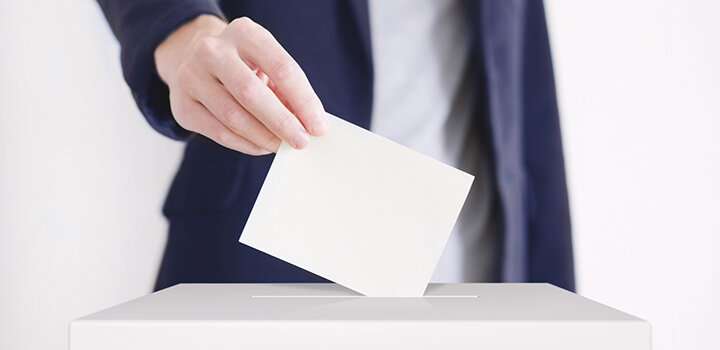Empowering electoral officials is crucial to building better elections

Findings from the first-ever cross-national surveys of electoral officials demonstrate the link between the workforce of electoral management bodies (EMBs) and the quality of the delivery of the election.
An international team of researchers show how organisations that tackle employee stress and give a greater voice for election officials, run elections better.
The research is published in a special issue of International Political Science Review on "Building Better Elections: Electoral Management and Electoral Integrity," published on Thursday. It comes after a series of elections, from Indonesia to the UK, saw problems with the management of elections in 2019.
Dr. James, who is head of UEA's department of Political, Social and International Studies, and lead co-author said: "We know that factors such as staffing, technology and organisational design and capacity impact on schools and hospitals, so we should expect the same to hold true of elections, too.
"Elections are the public service whose outcomes shape all other public policies and the provision of public services, so the quality of delivery is paramount to the public having confidence in the electoral process and democratic consolidation."
Writing on the University of East Anglia's Eastminster blog, the researchers set out five recommendations for better elections: improving independence, building capacity, addressing gender equality within EMBs, tackling employee stress and giving a greater voice for election staff.
No previous studies have examined electoral management body structures and workforces across the world.
The new research shows that personnel management can have an important effect on the performance of electoral management. For instance, electoral management bodies that enable greater opportunities for employees to be involved in decision-making processes perform better. Recruitment practices, job satisfaction and levels of stress are also important. The independence and capacity are also shown to be important.
Dr. James said: "The quality of electoral management matters immensely because it can undermine citizens' confidence in the electoral process in established democracies, threaten democratic consolidation or cause electoral violence in emerging democracies—or even affect the result of elections. Policy-makers have therefore expressed increased concern and interest in understanding electoral management and how we can build better elections.
"Electoral processes that are rife with administrative problems or partisan bias can generate election outcomes that do not reflect the will of the people, and electoral processes that lack transparency can generate distrust among citizens and political actors."
Electoral management bodies vary widely from country to country, from large, permanent and centralised organisations delivering elections, to smaller national organisations with workforces being buttressed from other departments at election time.
There are significant gender biases, with men holding the majority of senior positions. Workforces are overall well educated, but there is considerable variation across countries in the levels of experience.
All data was collected between July 2016 and October 2017. Data on the organisational structures was collected from 72 countries, and on workforces from 51 countries. Datasets range from small countries such as Dominica (population less than 80 000), to very large countries such as Indonesia (population more than 260 million). They also represent a variety of levels of economic development, and both long-standing established democracies and emerging democracies.
This research received funding from the Electoral Integrity Project, University of New South Wales and the University of East Anglia.
Dr. James co-edited the special issue of the International Political Science Review: "Electoral management and the organisational determinants of electoral integrity." His co-editors were Holly Ann Garnett, assistant professor of political science at the Royal Military College of Canada; Carolien van Ham, senior lecturer at the University of New South Wales, Australia; and Leontine Loeber, a Ph.D. candidate at UEA.
The article, "Better Workers, Better Elections? Electoral Management Body Workforces and Electoral Integrity Worldwide," is published on Thursday June 6 in a special issue of the International Political Science Review.
More information: Toby S James. Better workers, better elections? Electoral management body workforces and electoral integrity worldwide, International Political Science Review (2019). DOI: 10.1177/0192512119829516
Provided by University of East Anglia




















